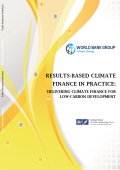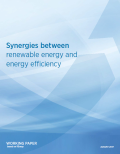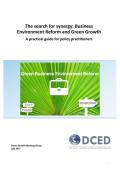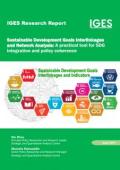
This report reviews 74 results-based climate financing (RBCF) programs implemented in developing countries with an objective to assess the characteristics and overall volume of funding flowing through RBCF programs, describe the various approaches to designing and implementing RBCF programs, and compare practical experiences with applying RBCF with the existing theory and literature.
The report finds that RBCF can: facilitate carbon pricing and market building, support host countries' policy processes to achieve their NDCs, and leverage private sector activity and financing. RBCF can thus play a critical role in mobilizing the resources and supporting the policies and actions needed to achieve the objectives of the Paris Agreement.


Business Environment Reform (BER) and Green Growth (GG) are both important parts of and strategies for sustainable development of emerging economies. While these two policy domains have their own core objectives and implementation strategies, there is a high potential for bringing out synergies but also to mitigate risks of trade-offs.
This practical guide is addressed to policy makers and development practitioners working on GG and BER. This purpose of this guide is to support program designers and managers at donor agencies, policy makers, development practitioners and evaluators in leveraging these synergies and avoiding trade-offs. The guide is meant for professionals working on BER and/or GG and those wishing to include elements and synergies in related policy areas.

The countries of the Association of Southeast Asian Nations (ASEAN) have been very active in promoting energy efficiency (EE) and renewable energy (RE) technologies in order to fulfil their global commitment on climate change. In the ASEAN Plan for Action for Energy Cooperation 2016-2025 (APAEC), EE and RE are key program areas to be addressed.
In this vein, examples of actions include feed-in tariffs (notably in Thailand and Malaysia) and the liberalization of the electricity market. In relation to EE, ASEAN member countries are progressively adopting Minimum Energy Performance Standards (MEPS) with EE standard and labelling programs. ASEAN member countries coordinate their energy policies through the ASEAN Energy Efficiency & Conservation Sub-Sector Network (EE&C-SSN) and the Renewable Energy Sub-Sector Network (RE-SSN). Both are composed of government agencies acting as program coordinators, and report to the Senior Officials Meeting on Energy (SOME) and the ASEAN Ministers on Energy Meeting (AMEM).

While being broadly framed as 17 separate and diverse elements, Sustainable Development Goals (SDGs) and associated targets inherently interlink with one another making up indivisible parts of sustainability from a systemic perspective. Actions or measures taken for achieving one goal may be mutually reinforcing or contradictory with achieving other goals. SDGs and associated targets through the connections among and between each other form a network of interlinkages. Understanding the interlinkages among the goals and between the targets is crucial for integrated governance and policy coherence for the implementation of SDGs. However, existing knowledge about these connections remains limited.
